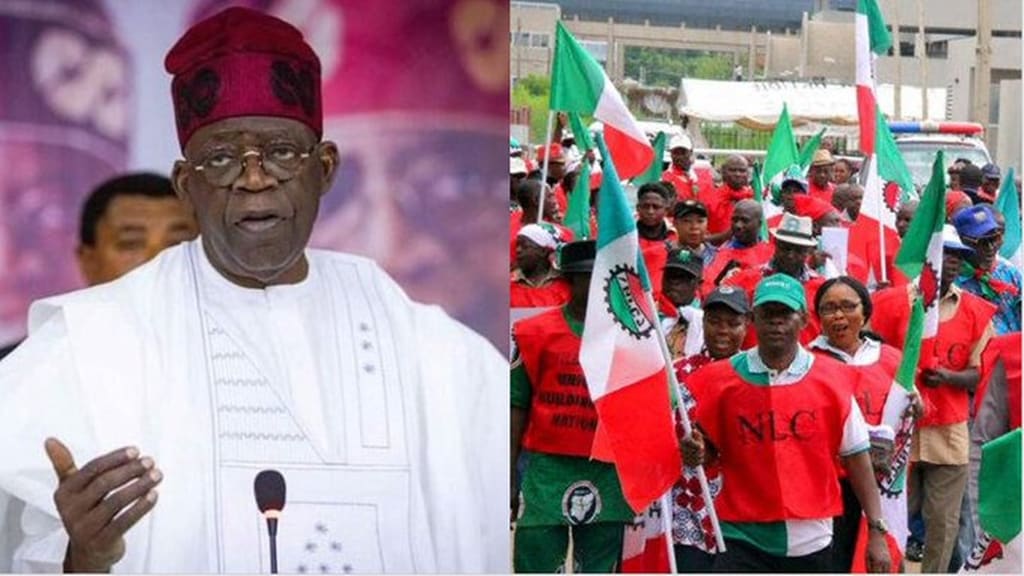NPC's Nationwide Strike
A Response to Fuel Subsidy Removal

In a bold move to express their discontent and protect the interests of Nigerian workers, the Nigeria Labour Congress (NLC) has declared a nationwide strike in response to the government's decision on the removal of fuel subsidy done by President Ahmed Tinubu.
This significant development has garnered widespread attention and triggered intense debates across the nation. In this article, we will delve into the reasons behind the NLC's action and shed light on the potential implications of the fuel subsidy removal.
Fuel subsidies have been a long-standing issue in Nigeria, with the government providing financial assistance to keep fuel prices artificially low. The intention behind these subsidies was to alleviate the burden on citizens and promote economic stability. However, in recent years, the sustainability and efficacy of such subsidies have come under scrutiny, leading to calls for their removal.
Reasons for the NLC's Action
Increased Cost of Living: One of the primary concerns for the NLC is the potential impact of fuel subsidy removal on the cost of living for ordinary Nigerians. The removal could lead to a significant increase in fuel prices, subsequently affecting transportation costs, food prices, and other essential commodities. This situation poses a threat to the economic well-being of the Nigerian workforce, particularly those with low incomes.
Inflationary Pressures: The removal of fuel subsidies can have a ripple effect on the economy, potentially leading to inflationary pressures. With transportation costs likely to rise, businesses may pass on the increased expenses to consumers, resulting in higher prices for goods and services. Such inflationary pressures can erode the purchasing power of workers, exacerbating their financial burdens.
Lack of Social Safety Nets: The NLC argues that the government's decision to remove fuel subsidies lacks adequate measures to protect vulnerable populations. The absence of robust social safety nets may disproportionately affect marginalized groups and the working class, making it more challenging for them to cope with the potential economic hardships caused by the removal of fuel subsidies.
Consultation and Transparency: The NLC has voiced concerns regarding the lack of consultation and transparency in the decision-making process leading to the removal of fuel subsidies. They argue that stakeholders, including labor unions, should have been included in discussions to ensure the collective interests of the Nigerian workforce are adequately considered. The NLC's strike can be seen as a call for greater inclusivity and transparency in policy formulation.
Implications of the Strike
The NLC's nationwide strike holds significant implications for the Nigerian economy and society at large. If the strike proceeds as planned, it could result in the disruption of various sectors, including transportation, healthcare, education, and public services. This disruption may lead to financial losses for businesses, inconvenience for the general public, and potential economic setbacks.
Additionally, the strike could exert considerable pressure on the government to engage in dialogue with the NLC and address their concerns. It may prompt a reevaluation of the fuel subsidy removal policy, leading to negotiations and potential adjustments to alleviate the burden on the Nigerian workforce.
The Nigeria Labour Congress' decision to announce a nationwide strike in response to the removal of fuel subsidies underscores the critical role labor unions play in safeguarding the rights and welfare of workers. The NLC's action highlights the concerns regarding the potential adverse effects of the subsidy removal on the cost of living, inflation, and social protection measures. As Nigeria navigates these challenges, it is crucial for stakeholders to engage in meaningful dialogue to find a balanced approach that ensures the well-being of both the Nigerian workforce and the country's economy as a whole.
Thank you for being a part of our vibrant community. Together, let's explore the wonders of knowledge and embrace the joy of learning and information.






Comments
There are no comments for this story
Be the first to respond and start the conversation.